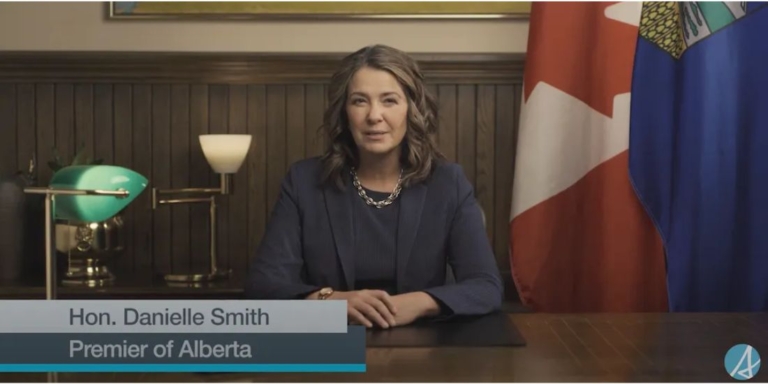As Albertans, we believe in fairness. Our governments, whether they be federal, provincial, or municipal, should not discriminate against people or businesses.
Historically, the Alberta government has argued that Alberta has not been treated fairly in confederation – and Premier Danielle Smith consistently uses fairness to Alberta in all her arguments with the feds.
And yet, within our own province, Premier Smith keeps unfairly dividing the energy industry.
Smith’s now (in)famous renewables energy pause creates an unequal playing field between renewable energy and the oil and gas industries.
Shock, Surprise and Falsehoods
Premier Smith implemented a surprise 7-month freeze on new renewable energy projects in August, leaving the renewables industry dazed and confused.
There was no warning for the pause and no consultations with the renewables industry, causing a huge loss of jobs and investment.
We doubt Smith would ever unilaterally impose a similar shutdown of approvals for the oil and gas without consultation!
Even worse, Smith’s government blamed provincial regulators for requesting the pause.
That blame has proven false because the regulators did not make the request, and a records check has shown that Smith’s government had already decided to stop approving renewables before receiving letters from the regulators supporting the implementation.
Premier Smith then defended the halt (in a new way), saying the government needed to review the impact of renewables on land use, reclamation, and viewscapes.
Really?


Stringent Standards for One, But Not the Other?
During the ensuing renewables shutdown, the Alberta Utilities Commission (AUC) has been tasked with examining reclamation issues and proposing regulatory changes. They were to draw on a series of consultant reports that address land impact concerns.
The first of the consultant’s reports were released on the AUC website.


The consultants advised the government to institute a reclamation security deposit program for renewable energy projects.
This security deposit would require developers to deposit funds to cover the costs of dismantling and cleaning up project sites once they reach the end of their lifespan.
Jorden Dye, director at Business Renewables Centre Canada, warns that such a program, if not thoughtfully designed, could jeopardize the viability of renewable projects in Alberta.
Dye points out that in other regions with thriving renewable sectors, such financial security requirements are either more flexible or limited to projects on public land.
The introduction of these stringent requirements for renewables contrasts sharply with the treatment of Alberta’s oil and gas companies.
Oil and gas companies, which historically have weak, unenforced obligations to reclaim land, have built up an estimated of upwards of $60 billion in liabilities for failing to clean up existing wells.
Now, the Alberta government is paying oil and gas companies to clean up wells even though oil companies legally had that obligation to begin with. In contrast, Smith’s government is going to demand that renewables prepay for their presumed cleanup before the fact!
This bias in regulatory treatment raises questions about fairness and consistency in environmental stewardship.
Supporters of the renewable sector argue that while managing the environmental impact of energy projects is reasonable, it is crucial to apply consistent standards across all energy sectors.
The renewable industry, they argue, should not be unfairly burdened with regulations that are not similarly imposed on oil and gas operations.
Moreover, there’s criticism that the studies commissioned by the AUC did not adequately evaluate whether there is actually a growing problem of wind and solar abandoning sites without cleanup.
Unlike the ongoing problem of abandoned, leaking oil and gas wells, the Canadian Renewable Energy Association argues that “orphaned” solar or wind farms are unlikely because wind and solar never dry up. The only upgrades they need are new parts that need to be swapped out about every 25 years.
The Utilities Commission assumed that a reclamation system for renewables is necessary without examining the existing oil and gas sector issues.
The debate extends beyond environmental responsibilities to the broader impact of these policies on local economies and land use.


Renewable energy projects have brought small towns significant investment and revenue, particularly in rural areas.
However, there’s tension between encouraging this new industry and protecting valuable agricultural land.
This tension has led to proposals like an “agriculture first approach,” outlined in the consultant report, which aims to balance energy development with agricultural preservation. The Utilities Commission assumed that renewables would negatively impact farming.
But technologies like agri-voltaics show that agricultural yields can actually improve with solar installations, making a win-win for renewables and farmers.
The current disparity in treatment highlights the need for equitable and consistent policies that ensure all energy sectors are held to similar standards. Albertans deserve a fair and sustainable approach to energy development.
How can we demand fairness for our province in Canada when, in our own province, we hold different standards for oil and gas over renewables?






